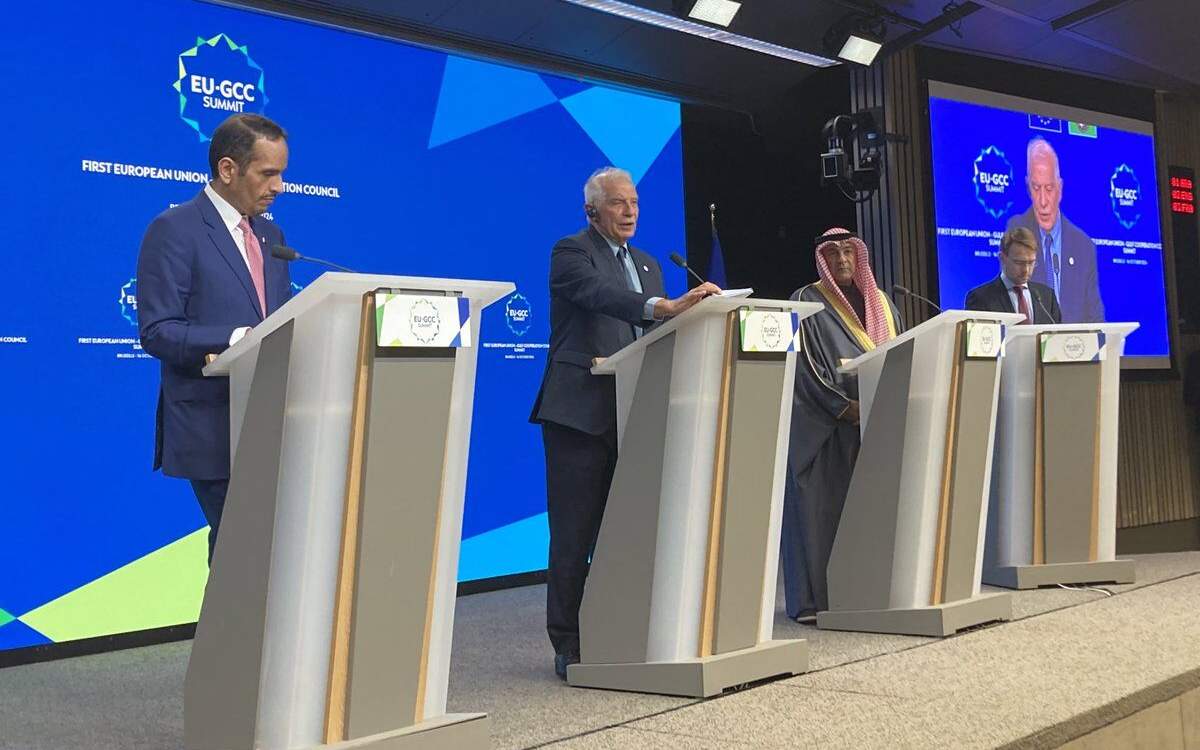The Iran Project
: The leaders and representatives of Persian Gulf Cooperation Council (PGCC) and the European Union (EU), in a joint statement, have stressed the need for reducing regional tensions and resolving issues through diplomatic interaction, including on Iran’s nuclear deal also known as the Joint Comprehensive Plan of Action (JCPOA).
Thursday 17 October 2024 - 11:00
Story Code : 429851
Source : IRNA
PGCC, EU call for diplomacy on JCPOA, regional issues
The statement also emphasized that they are committed to a diplomatic solution to Iran's nuclear issue without pointing to the main culprit behind the current situation of the JCPOA and the actions taken by Iran within the framework of the 2015 deal as well as a law approved by the country’s parliament (Strategic Action Law to Lift Sanctions and Safeguard the National Interests of Iran).
“We regret that Iran’s unabated nuclear advances over the last five years have made a return to the JCPOA increasingly difficult”, it said.
However, the statement intentionally or unintentionally failed to mention the constant and extensive cooperation between Iran and the International Atomic Energy Agency (IAEA) and said: “We urge Iran to implement all its safeguards obligations under the Nuclear Non-Proliferation Treaty and return to the implementation of the Addition Protocol”.
“We share a clear determination that Iran must never develop or acquire a nuclear weapon. We reaffirm the importance of the UNSC Resolution 2231, and our lasting commitment to ensure that the Gulf and wider region remains free of nuclear weapons”, they said, repeating claims leveled by the US and its western allies under the Zionist regime’s propaganda stunt over the past years on Iran's peaceful nuclear program.
While emphasizing “the importance of adherence to international law, including the UN Charter, based on respect for sovereignty, territorial integrity, noninterference in internal affairs, and refraining from the use of force or threats”, the PGCC-EU statement also repeated the false and baseless claims of the United Arab Emirates about the three Iranian islands in the Persian Gulf.
“We call on Iran to end its occupation of the three islands of Greater Tunb, Lesser Tunb, and Abu Musa, which constitutes a violation of the sovereignty of the UAE and the principles of the Charter of the UN”, they added.
Iran has repeatedly condemned such claims, calling the three Persian Gulf islands inseparable parts of its territory and has waned against questioning its sovereignty and territorial integrity.
The repetition of baseless claims of the UAE on the three Iranian islands and the issuing of political statements in this regard are groundless, Iran’s Foreign Ministry stated earlier.
Wednesday’s statement covered almost all regional issues, ranging from the ongoing Zionist war and genocide in Gaza and Lebanon to the crisis in Yemen, Iraq, Syria, Sudan and Somalia, with both the EU and the PGCC pledging to coordinate on each issue diplomatically.
Regarding the claims surrounding Iran’s peaceful nuclear program, the issue has turned into an unnecessary crisis because it was not Iran but the United States that under the influence of the Zionist regime and with the complicity of the European Troika (E3) violated the 2015 deal.
Before signing the JCPOA agreement, the Westerners presented Iran's nuclear program as a threat to international peace and security citing the United Nations Charter and tried to link its solution with military action and sanctions. But they took a U-turn despite Iran adherence to the JCPOA and the IAEA in its 16 reports calling Iran a responsible country that implemented its obligations flawlessly.
It was only in 2018, one year after the US unilateral withdrawal from the deal, re-imposition of sanctions and inaction of by three European signatories, Iran gradually scale down its commitments.
As a result, the JCPOA member parties issued a statement and made 11 commitments to compensate for the economic damages caused by the unilateral action of the United States.
After taking office in January 2021, the Democratic administration under Joe Biden condemned the unilateral action by its predecessor, but it too continued with the so-called maximum pressure policies against Iran coined by Donald Trump.
Iran has, time and again, said that its nuclear-related measures are reversible if the other parties, including the US abide by the JCPOA clauses.
Reporter : Editorial of The Iran Project
# Tags











